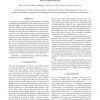Free Online Productivity Tools
i2Speak
i2Symbol
i2OCR
iTex2Img
iWeb2Print
iWeb2Shot
i2Type
iPdf2Split
iPdf2Merge
i2Bopomofo
i2Arabic
i2Style
i2Image
i2PDF
iLatex2Rtf
Sci2ools
127
click to vote
ICMCS
2010
IEEE
2010
IEEE
Disparity-compensated compressed-sensing reconstruction for multiview images
In a multiview-imaging setting, image-acquisition costs could be substantially diminished if some of the cameras operate at a reduced quality. Compressed sensing is proposed to effectuate such a reduction in image quality wherein certain images are acquired with random measurements at a reduced sampling rate via projection onto a random basis of lower dimension. To recover such projected images, compressed-sensing recovery incorporating disparity compensation is employed. Based on a recent compressed-sensing recovery algorithm for images that couples an iterative projection-based reconstruction with a smoothing step, the proposed algorithm drives image recovery using the projection-domain residual between the random measurements of the image in question and a disparity-based prediction created from adjacent, high-quality images. Experimental results reveal that the disparity-based reconstruction significantly outperforms direct reconstruction using simply the random measurements of t...
| Added | 26 Jan 2011 |
| Updated | 26 Jan 2011 |
| Type | Journal |
| Year | 2010 |
| Where | ICMCS |
| Authors | Maria Trocan, Thomas Maugey, James E. Fowler, Béatrice Pesquet-Popescu |
Comments (0)

